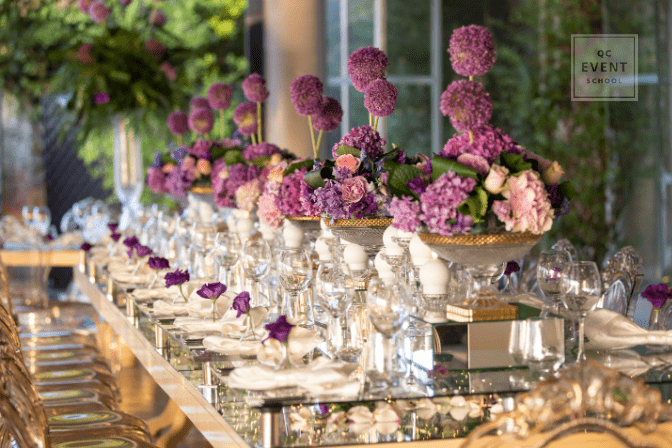
From the Experts, Student Ambassador
What’s NOT Included in My Job Description as an Event Planner
Nicole Thielmann is a QC Student Ambassador and the proud owner of Willow North Events. She has graduated from QC Event School’s Event and Wedding Planning and Destination Wedding Courses. With a long list of happy clients, Nicole’s business specializes in social events, weddings, and handmade event decor. Today, Nicole is here to break down what is and isn’t include in the event planner job description.
What is an Event Planner?
Event planners are often referred to as the “miracle workers” of the events industry. From planning weddings to corporate events, birthday parties to fundraisers – no two days are the same in the life of an event planner. Working behind the scenes to create seamless events is a lot of hard work, and there are many responsibilities that an event planner needs to take on, in order to be successful.
Here are a few of the most common duties in an event planner job description:
- Liaising with vendors, suppliers, and venues
- Booking contracts
- Overseeing the logistics and scheduling of the event
- Managing and working within the client’s budget
- Assisting with the event theme/concept development
- Creating a critical path and day-of timeline for the event
- Being the main point of contact on the day of the event for vendors, clients, and guests
The job description of an event planner can also change depending on what type of contract you have with your client. For example, if you’re planning a wedding, your client might hire you for full-service planning, month-of coordination, or only day-of coordination. Depending on the contract you have with your client, your job description will vary.
However, even though an event planner job description isn’t always easy to specify, there are some very important things to note about what an event planner is NOT.
What an Event Planner is NOT
Some clients may not understand what their event planner is and is not capable of providing them. The following are things that are not actually part of an event planner’s job description:
1 – Being a Personal Assistant
An event planner’s job is to assist their client through the planning process. However, they’re not their client’s personal servant. Some customers might forget where this line is. If they do, they could wind up overstepping their boundaries. This is why it’s important to maintain boundaries and open communicate with your client. That way, if they’re treating you disrespectfully or requesting services you can’t provide, you can put a stop to it sooner rather than later.
It’s also important to clearly indicate the exact services you will be providing on your client contract. This will decrease the chances of running into issues later on. If you and the client agree to add or remove services from the agreement, it should always be done in writing and signed by both parties.
2 – Controlling the Actions of Vendors, Suppliers, and Other Third-Party Contributors
As an event planner, chances are you’re naturally organized and punctual. However, while you can do everything in your power to try and ensure that vendors meet their deadlines, arrive on time (or at all), and provide flawless services, you ultimately can’t control the actions of third-parties.
With ample research and diligence on your end, you can do your best to bring everything together harmoniously. Make sure you vet all your vendors ahead of time. Try to get references whenever possible! Eventually, you’ll have a great preferred vendor list, and will feel more confident hiring third-parties. Just keep in mind that at the end of the day, you cannot control everything –and hopefully, the client understands that, too.
3 – Having Any Control Whatsoever Over the Weather
Although we all hope and pray for perfect weather on the day of an event, inclement weather unfortunately happens sometimes! The client may not like it, but they also don’t have the right to get upset with you if the weather isn’t cooperating.
Something you CAN be in control of as an event planner is having a solid backup plan in the event of inclement weather. For example, if your client is having an outdoor event, it’s always a good idea to have a tent set up, or another indoor option on-site. That way, the guests have somewhere to go if they need shelter.
You should also give yourself enough time on the day of the event to make the executive decision to move the event indoors. You’ll need time to move the event decor and furniture to the new space!
4 – Being Your Client’s Emotional Punching Bag
Most clients will be a joy to work with. But some clients can make the job difficult, if things don’t go their way. It’s never an event planner’s responsibility to take verbal, mental, or emotional abuse from a client.
Always be professional and respectful with the client – but know when to stand up for yourself, too. Although you can never really know the outcome of a professional relationship between you and your client, it’s a good idea to have an initial client consultation prior to signing any contracts. This not only allows the client to get to know you as a planner; it allows YOU to get to know your client. Then, you’ll be able to decide if they would be a good fit for your business and planning style.
Why Professional Training is Important
As an event planner, there are many different situations you can find yourself in, and they’re not always going to be easy to navigate. But if you have proper training under your belt, you’ll be better prepared to handle the unexpected.
Now technically, not all event planners need to be professionally certified. But it’s still a definite must! Through reputable training, you’ll gain a comprehensive understanding of your duties as an event planner. Plus, you’ll also learn the things that fall outside of your job description. You’ll discover how to properly deal with any type of client, challenge, or emergency situation.
For me personally, I’m always going above and beyond to try and exceed client expectations. However, sometimes in doing so, it creates higher expectations in my clients than what was initially agreed upon in our contract. My training with QC Event School has really helped me to recognize my value as an event planner, as well as the importance of setting boundaries with my client from the get-go.
I can still go above and beyond, and create amazing events for my clients. But I no longer allow myself to be pushed to my limits by doing more than I can manage.
Why I Recommend QC Event School
As I mentioned above, even though it’s not mandatory to have formal training as an event planner, it’s still a very good idea to get certified. Getting formal training will give you the confidence that is necessary to navigate the event planning industry. That being said, I know that going into a physical classroom isn’t always an option in our current world of social distancing.
This is a big reason why online courses are becoming more and more popular. In my experience, they’re such a great way to learn new skills on your own time, without having to drop everything to go back to school. QC Event School is completely online, and offers a flexible and self-paced learning environment. They’re accredited with the Better Business Bureau (BBB), and are approved by the International Live Events Association (ILEA).
I took the plunge with QC Event School and it’s proven to be extremely beneficial to my career! I now have the knowledge and understanding that I need in order to feel confident as an event planner. Through my online training, I know what an event planner job description really is – and I know how to set professional boundaries.




